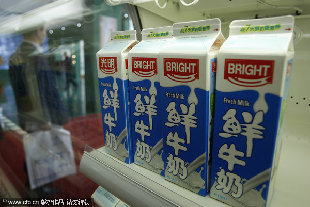
Shanghai-based Bright Dairy displays its products?at an exposition. [CFP]
| ?
|
|
Shanghai-based Bright Dairy displays its products?at an exposition. [CFP] |
Up to a quarter of the country's dairy producers could be eliminated in an ongoing campaign to reshuffle a sector marred by a slew of safety scandals in the last couple of years, insiders have revealed.
Since September, food-safety watchdogs have required manufacturers of registered milk products to renew their licenses under tightened regulations. The new registration deadline is the end of March.
To be fully accredited, producers must have adequate equipment for conducting melamine and food-additive tests, as well as have designated personnel for daily product checks, among other requirements that include better training for staff, according to a notice jointly issued in November by the General Administration of Quality Supervision, Inspection and Quarantine, the Ministry of Industry and Information Technology and the National Development and Reform Commission.
"About 20 to 25 percent of the existing milk-processing companies will disappear from the market, as has been widely estimated," Wang Dingmian, former executive director of the Dairy Association of China, was quoted as telling China Business News.
Many of them are small companies, accounting for a mere 10 to 12 percent of the market share, he said.
There are about 1,800 companies that deal in dairy products, but about 60 to 70 percent of the domestic market share is controlled by five diary giants, according to a report by the National Business Daily.
The country's dairy sector was rocked by a melamine scandal involving tainted milk powder in late 2008 that caused the deaths of six babies and sickened about 300,000 other children.
It prompted authorities to launch a set of nationwide campaigns to regulate the dairy industry.
Several provinces have disclosed the names of companies having failed to meet the new standards during the overhaul.
At least 20 out of 61 dairy companies are to be closed in Hebei Province, a major dairy-producing region, according to a report by Economic Information Daily.
Shaanxi Province announced last week that 24 of 78 diary producers had been shut down, before a similar statement by officials in the Ningxia Hui Autonomous Region said the licenses of 14 companies had been revoked.
Some producers and farmers with milk-producing cows, however, complained that the new regulations were costly and would force them out of business.
"A large device used for melamine testing could cost up to 10 million yuan ($1.4 million). That would be a burden for small producers," the National Business Daily quoted Yang Min, who holds stock in a small diary company, as saying.
Even if the producer can afford the equipment, a daily expenditure of 1,200 to 1,500 yuan from the testing would also add up, Yang argued, adding that the major stockholders decided to sell their factories.
Wang Xinhao, from Yantai in Shandong Province, whose family raises more than 30 milk cows, told the Global Times Thursday, "We will have fewer buyers if many of the small dairy factories close."
Many farmers in his village have opted to sell their cows since business became worse, he said.
However, He Chengwei, a sales manager at a farm in Shanxi Province, who owns 10,000 cows, said integrated breeding at large-scale farms should be part of the solution to secure product safety.
"Closer quality control becomes feasible in that sort of breeding. Small cow farms should eventually disappear," He told the Global Times.
Dong Jinshi, a Beijing-based food-safety expert and secretary-general of the International Food Packaging Association, told the Global Times that it is high time for China to shut down small, unqualified dairy companies.
"Otherwise, the country's dairy industry, even the whole food industry, would be ruined," he said.
According to Dong, excessive numbers of dairy licenses have been issued in the past, but the supervision of these dairy companies lags behind, resulting in the dairy industry being riddled with scandals.
"Small companies can be regrouped into relatively bigger ones after their closures to specialize in middle- and low-end products to cater to certain groups of consumers," he said.
Since the melamine-tainted powder scandal, more and more domestic consumers are turning to international brands.
Recently, many reports have shown that many milk-powder stores in Hong Kong and Macao began to issue purchase limits for mainland customers, to prevent shortages that would affect local parents.
Zhang Yongjian, an expert on the food and drug industry with the Chinese Academy of Social Sciences, told the Global Times that the reshuffle of the dairy industry will result in temporary shortages in dairy supply, but it will save China's dairy industry in the long run.
"With the shoddy products weeded out from the market, promising manufacturers, especially regionally renowned ones or second-tier brands, will have bigger room to grow and prosper in the market to create a benign cycle for China's dairy industry," he said.